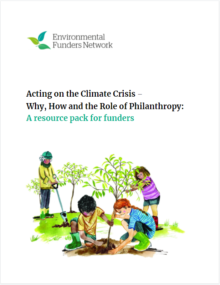What the Green Groups Said: Insights from the UK Environment Sector
 In 2016/17, the Environmental Funders Network surveyed the chief executives of UK environmental groups. The results, summarised in What the Green Groups Said, allowed us to develop a picture of where the sector is getting its funds from, what it is spending its income on, what its key successes and failures of recent years have been, and, crucially, what its leaders think the sector needs to become markedly more effective.
In 2016/17, the Environmental Funders Network surveyed the chief executives of UK environmental groups. The results, summarised in What the Green Groups Said, allowed us to develop a picture of where the sector is getting its funds from, what it is spending its income on, what its key successes and failures of recent years have been, and, crucially, what its leaders think the sector needs to become markedly more effective.
Altogether, 92 charitable organisations conducting environmental work responded to the survey, with a combined annual income of over £1 billion. Highlights from the report include the following:
- Nearly 2/3 of the groups think their income is at risk, to varying degrees, as a result of Brexit
- Over 1/3 of the groups have felt that their work has been limited by so-called ‘closing space’ for civil society here and abroad, i.e. changes to laws or charity guidance that limit their capacity to deliver on their missions
- Income declined in real terms for environmental groups from 2011-2015 by over 7%
- Over 50% of the annual expenditure of the groups surveyed went towards biodiversity and land conservation for the year in question (2015), while climate change work (including work on energy and transport) accounted for less than 10% of expenditure. Meanwhile, expenditure on climate, energy and transport declined by 16% in real terms between 2012 and 2015. And yet…
- Asked to describe the environment sector’s greatest successes of the last few years, sector leaders most often described successes related to climate change-related work. Topping the list of the sector’s successes were references to the Climate Change Act and its subsequent budgets, the establishment of new marine conservation zones, the Paris agreement, anti-fracking campaigning, and increases in renewable energy production in the UK
- Sector leaders named ClientEarth as the ‘most effective environmental organisation given the resources at its disposal’, with the RSPB, Greenpeace and Friends of the Earth following
- Asked to describe the environment sector’s worst failures of the last few years, sector leaders most often cited their collective failure to raise the environment as an issue in the run-up to the EU referendum. Many respondents also identified poor communications that have failed to engage the public or reach beyond the choir as a key failure of the sector.
- Sector leaders were in broad agreement that, when the sector has been successful, it has often been attributable to: 1) strong advocacy and policy work, 2) good communications, grounded in science, that engaged the right audiences, and 3) strong collaboration between groups. Likewise, failures were blamed on an absence of such approaches
- Leaders called for more investment in and focus on those same areas: advocacy/policy work, communications (including efforts to shift values and social norms) and collaboration between groups.
Download the full report here.
